人教版(新课程标准)选修七Unit 4 Sharing Reading 公开课课件(共27张PPT)
文档属性
| 名称 | 人教版(新课程标准)选修七Unit 4 Sharing Reading 公开课课件(共27张PPT) |
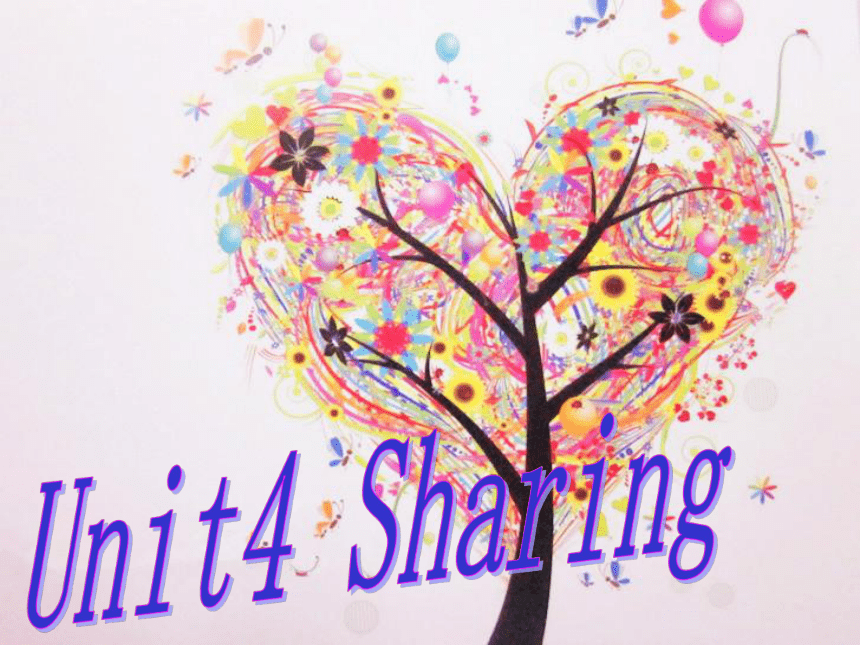
|
|
| 格式 | pptx | ||
| 文件大小 | 2.3MB | ||
| 资源类型 | 教案 | ||
| 版本资源 | 人教版(新课程标准) | ||
| 科目 | 英语 | ||
| 更新时间 | 2023-03-10 07:48:31 | ||
图片预览

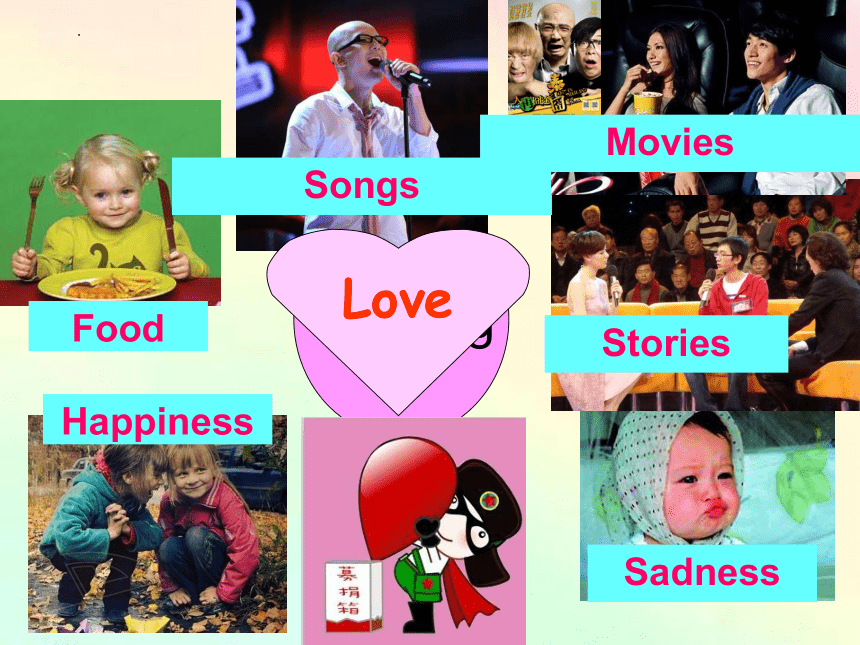
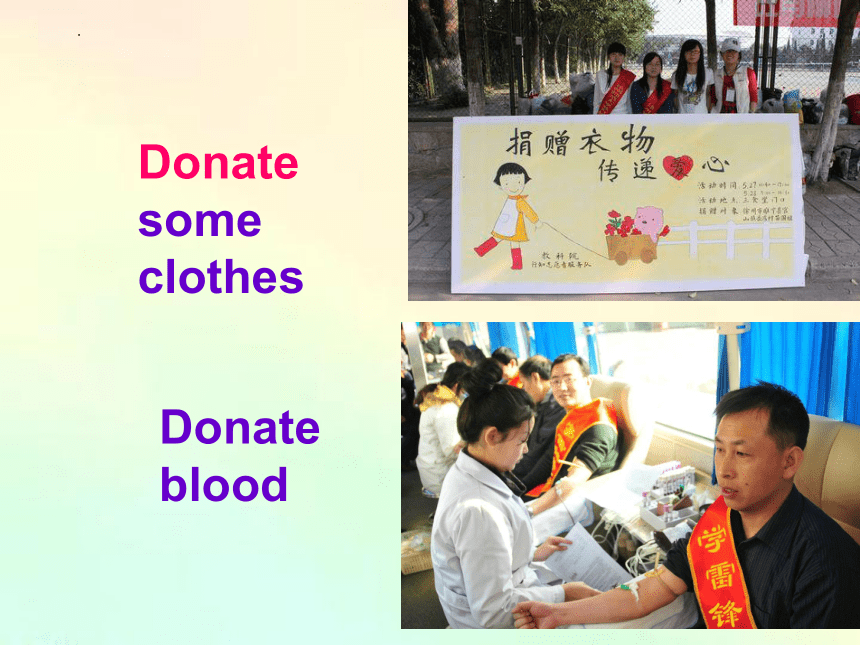
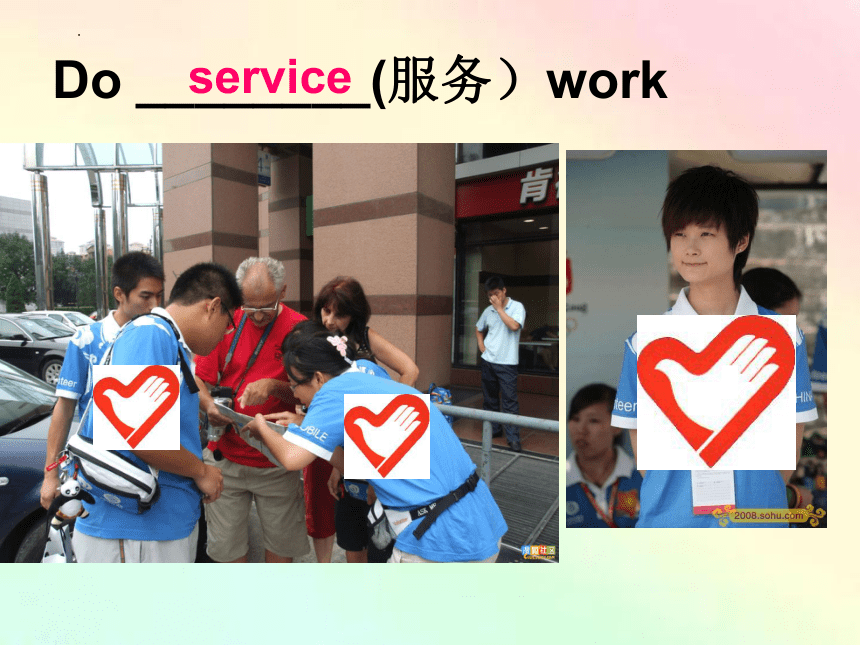
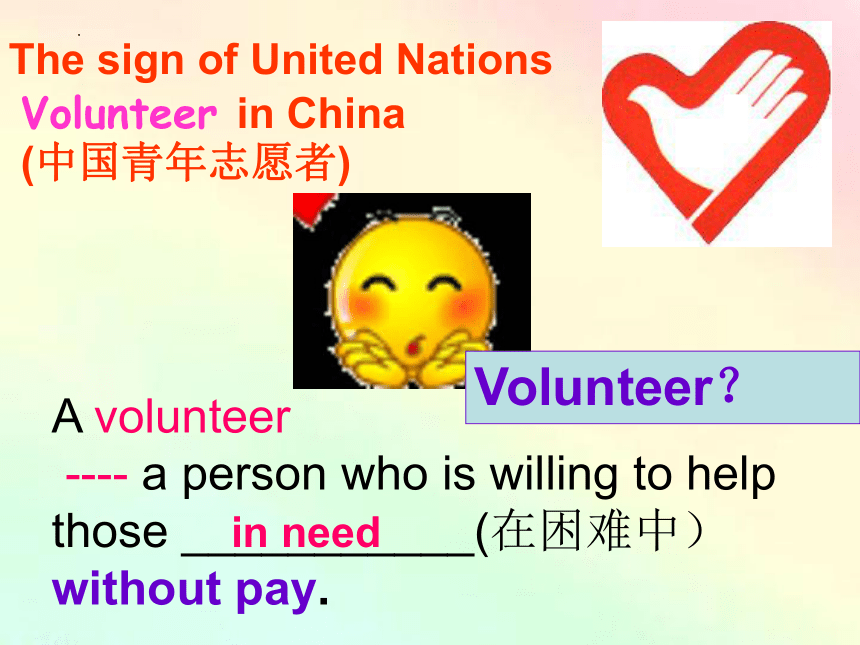
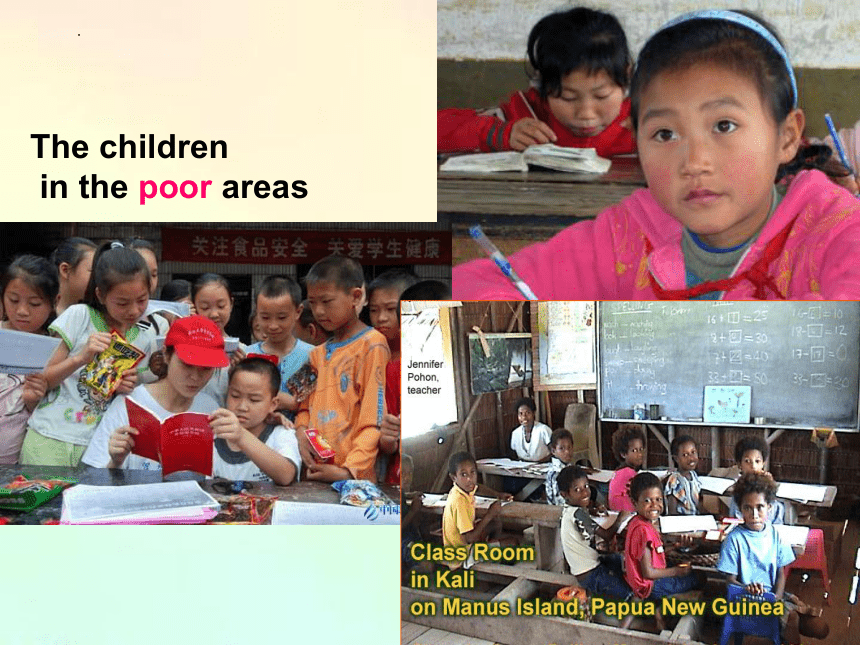
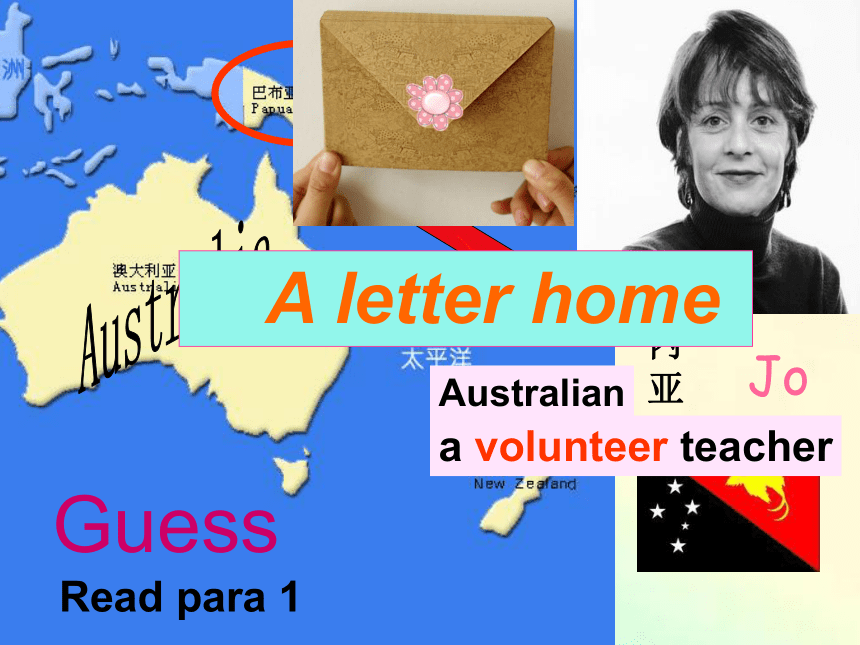
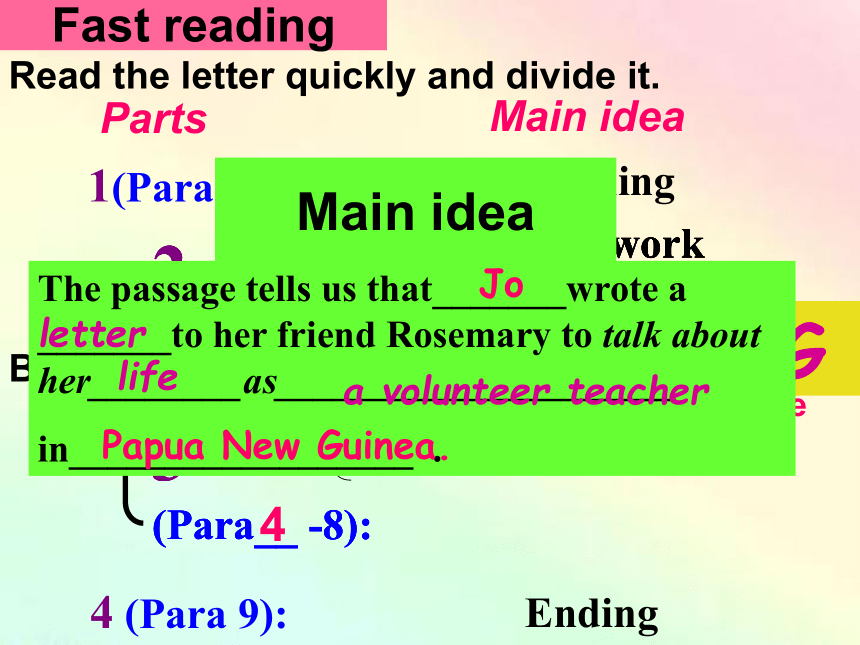

文档简介
(共27张PPT)
Unit4 Sharing
Sharing
Stories
Happiness
Sadness
Love
Food
Songs
Movies
Donate
some clothes
Donate blood
Do ________(服务)work
service
A volunteer
---- a person who is willing to help those ___________(在困难中)without pay.
in need
The sign of United Nations
Volunteer in China
(中国青年志愿者)
Volunteer?
The children
in the poor areas
Papua
New
Guinea
巴
布
亚
新
几
内
亚
Australia
a volunteer teacher
Australian
A letter home
Jo
Guess
Read para 1
Jo’s teaching work
in the_________.
Jo’s visit to__________
Beginning
1(Para 1):
2
(Para 2- _ ):
3
(Para__ -8):
4 (Para 9):
Ending
Parts
Main idea
3
4
high school
Body
Fast reading
Read the letter quickly and divide it.
Jo’s life in PNG
Jo’s teaching work
in the_________.
2
(Para 2- _ ):
3
(Para__ -8):
Jo’s teaching work
in the_________.
2
(Para 2- _ ):
Tombe’s home
3
(Para__ -8):
Jo’s teaching work
in the_________.
2
(Para 2- _ ):
Main idea
The passage tells us that_______wrote a _______to her friend Rosemary to talk about her________as_____________________
in__________________ .
Jo
Papua New Guinea.
letter
a volunteer teacher
life
No______
No______
No______
No______
electricity
water
textbooks
equipment
School Conditions
A. normal
B. simple and rough
C. advanced
Read carefully and get the answers.
Part 2--Jo’s teaching work in the high school
Detailed reading
Does Jo like teaching there
Teacher –Jo: The students-Boys:
“Science is my most challenging subject …” the word means: ____________
A. boring but important
B. difficult but exciting
C. interesting but necessary
excited
B. energetic
C .frightened
B
C
Careful thinking (para3)
Tombe’s home
They jumped out of the windows in the science lesson because they
were_______
Do the boys like Jo
Read carefully and get the answers.
Round /made of _____and____
No ________
Small ________
broom
tin plates
jars
Possessions
House
window
Poor
doorway
Part 3( para 4-8) Jo’s visit to Tombe’s home
One _________
A few _________
A couple of_______
Kau Kau (sweet potato)
_________________
_________________
peanuts
Diet
corn
greens
bamboo
grass
Read again.(para5-7)
Do true or false.
The hut was so comfortable that Jo could sleep alone.
( )
2.Jo could talk Tombe’s family freely.
( )
3. Tombe threw the tin can out of the doorway because he believed that the leftovers would cause bad luck. (para7)
( )
adjust
share
platform
participate
interpreter
conversation
=attract evil spirits
T
F
F
( para5. )
(para6 )
The story of Jo’s visit to Tombe’s home
Key words:
Retell the story of Jo’s visit to Tombe’s home.
share
participate
interpreter
conversation
attract evil spirits
Main idea of the story: Last weekend, Jo and another
teacher Jenny visited a student Tombe’s home .
(para4-8)
When they arrived,
his mother Kiak …
Then his father Mukap
…
That night Kiak would …
Outside Mukap ...
They ate and talked.
Jo could’t …
Later ,Jo was
puzzled when Tombe …
The next morning…
When they arrived,
Kiak started crying to welcome them.
Then his father Mukap
____them to the house.
That night Kiak would______
the platform with them.
Outside Mukap cooked
the meal .
They ate and talked .
Jo couldn’t ___________in
the ___________but Tombe
could be their interpreter.
Later ,Jo was puzzled
when she saw Tombe
throw the tin can out of
the doorway.
Tombe told her
they believed that
the leftovers would
attract_____________.
The next morning,
they left the village.
Last weekend, Jo and another teacher Jenny visited a student Tombe’s home.
led
share
participate
conversation
evil spirits.
How did Jo feel after the visit
…It was such a privilege to…
Happy
Like to be a volunteer teacher
1. Thanks for your letter. It was wonderful to hear from you.
hear from: v. 接到...的信
How often do you hear from your sister
你多长时间接到你姐姐一次信
Have you hear from him by last week
到上星期为止你们接到过他的信吗?
It was a pleasure to hear from you.
很高兴收到你的信。
I hear from my cousin every two weeks.
我每两星期就会收到我表哥的来信。
注意:hear from后面只能接表示人的名词或代词,不可接letter作为它的宾语。
2. I know you’re dying to hear all about my life here.
be dying to do / for sth. 渴望做某事;迫切想要
She is dying to go abroad.
I am dying for a glass of water.
I am dying to go abroad.
He was dying for a little wine.
“渴望”的类似说法
be thirty for sth.
desire to do sth.
have a strong desire for sth.
long to do /for sth.
3. …have walked a long way, sometimes up to two hours, to get to the school.
up to = as many as/ as much as
He can earn up to $50,000 a year.
up to 还可以表示
1)be up to sth = be busy doing sth. 忙于
2)It is up to sb to do sth 由某人负责做某事
3)一直
She lived at home right up to / until she got married.
What are these naughty boys up to
It is up to me to do this task.
I am not sure if she is really up to that job.
4. I’m still trying to adapt to these conditions but, one thing is …
adapt (oneself) to 适应,适合
The new students are very slow to adapt to the rules.
新生对于那些规定适应得很慢。
You must adapt to the norms of the society you live in.
在社会中生活就要遵循社会行为准则.
Over the years, we all learned to adjust, to become more comfortable with each other, and to adapt to our new family arrangement.
年复一年,我们都学会了调整自己,学会了彼此宽容,学会了适应我们新的家庭规则。
注意:adapt (oneself) to 的to是介词,后跟名词或动词-ing形式。类似的词组有:
be used to _______________
be related to _______________
lead to _______________
devote oneself to _______________
contribute to _______________
access to _______________
look forward to _______________
pay attention to _______________
give rise to _______________
be accustomed to _______________
be addicted to ________________
习惯于
与……相关
导致/通向
献身于
为……作贡献
接近/进入(某地的)方法
盼望
注意
引起
习惯于
沉溺于
5. The boys had never come across anything like this.
come across vt. 碰到(遇到,无意中发现)
She ,came across some old photographs in a drawer.
她在抽屉里偶然发现一些旧照片.
In carrying out the plan we are bound to come across difficulties, but we are determined to overcome them all.
我们在实行这个计划时必然会遇到困难,但我们有决心把它们一一克服。
I ,came across an old school friend in Oxford Street this morning.
今天早上我在牛津大街碰见一位老校友.
6. In fact, I wonder whether I’m making any difference to these boys’ lives at all.
make a difference 有影响,很重要
make a great difference 有很大差别, 有很大不同,有很大的关系[影响]
make some difference to 对...有些[没有]关系
make no difference to 对...有些[没有]关系
Dollars make no difference to him.
I don’t think it will make any difference.
wonder 用法归纳
wonder wh-词 + to do 想知道……
wonder wh- / if + 从句 想知道……
It’s no wonder + (that) 从句 难怪,怪不得,不足为奇
They wondered at his learning.
他们对他的学识感到惊奇。
I wonder who he is. 我很想知道他是谁。
I was just wondering about that myself.
我就是觉得这件事莫名其妙。
No wonder people say that computers are taking over the world.
难怪有人说电子计算机正渐渐接管世界。
7. Tombe’s father, Mukap, led us to his house, a low bamboo hut with grass sticking out of the roof.
stick out: vt. 突出(坚持,伸出)
She stick out her foot and tripped him over.
她伸出脚把他绊倒。
He is determined to stick out the race even if he finishes last.
即使跑最后一名,他也决心坚持跑完。
9. Tombe told me that the can was heated to dry out the leftover food. They believe that any leftovers attract evil spirits in the night so the food is dried up in the can.
dry out (使)变干,干透
Put the top back on that felt-tip pen or it will dry out.
给毡头笔套上笔帽,不然干了。
Don't leave the bread on the table; it will dry out.
别把面包放在桌子上,它会干掉的。
dry up (河流,湖泊等)干枯,(使)完全变干
The intense heat has dried up the pond.
酷热使池水干枯。
The sun came out and dried up the streets.
太阳出来把马路晒干了。
During the drought the river dried up.
10. It was such a privilege to have spent a day with Tombe’s family.
privilege: [ ‘privilid ] n. 特权,特别恩典,基本人权 v. 给与...特权
It was a privilege to work with him.
和他在一起工作是一项殊荣。
She had led a life of luxury and privilege.
她过着养尊处优的生活。
Unit4 Sharing
Sharing
Stories
Happiness
Sadness
Love
Food
Songs
Movies
Donate
some clothes
Donate blood
Do ________(服务)work
service
A volunteer
---- a person who is willing to help those ___________(在困难中)without pay.
in need
The sign of United Nations
Volunteer in China
(中国青年志愿者)
Volunteer?
The children
in the poor areas
Papua
New
Guinea
巴
布
亚
新
几
内
亚
Australia
a volunteer teacher
Australian
A letter home
Jo
Guess
Read para 1
Jo’s teaching work
in the_________.
Jo’s visit to__________
Beginning
1(Para 1):
2
(Para 2- _ ):
3
(Para__ -8):
4 (Para 9):
Ending
Parts
Main idea
3
4
high school
Body
Fast reading
Read the letter quickly and divide it.
Jo’s life in PNG
Jo’s teaching work
in the_________.
2
(Para 2- _ ):
3
(Para__ -8):
Jo’s teaching work
in the_________.
2
(Para 2- _ ):
Tombe’s home
3
(Para__ -8):
Jo’s teaching work
in the_________.
2
(Para 2- _ ):
Main idea
The passage tells us that_______wrote a _______to her friend Rosemary to talk about her________as_____________________
in__________________ .
Jo
Papua New Guinea.
letter
a volunteer teacher
life
No______
No______
No______
No______
electricity
water
textbooks
equipment
School Conditions
A. normal
B. simple and rough
C. advanced
Read carefully and get the answers.
Part 2--Jo’s teaching work in the high school
Detailed reading
Does Jo like teaching there
Teacher –Jo: The students-Boys:
“Science is my most challenging subject …” the word means: ____________
A. boring but important
B. difficult but exciting
C. interesting but necessary
excited
B. energetic
C .frightened
B
C
Careful thinking (para3)
Tombe’s home
They jumped out of the windows in the science lesson because they
were_______
Do the boys like Jo
Read carefully and get the answers.
Round /made of _____and____
No ________
Small ________
broom
tin plates
jars
Possessions
House
window
Poor
doorway
Part 3( para 4-8) Jo’s visit to Tombe’s home
One _________
A few _________
A couple of_______
Kau Kau (sweet potato)
_________________
_________________
peanuts
Diet
corn
greens
bamboo
grass
Read again.(para5-7)
Do true or false.
The hut was so comfortable that Jo could sleep alone.
( )
2.Jo could talk Tombe’s family freely.
( )
3. Tombe threw the tin can out of the doorway because he believed that the leftovers would cause bad luck. (para7)
( )
adjust
share
platform
participate
interpreter
conversation
=attract evil spirits
T
F
F
( para5. )
(para6 )
The story of Jo’s visit to Tombe’s home
Key words:
Retell the story of Jo’s visit to Tombe’s home.
share
participate
interpreter
conversation
attract evil spirits
Main idea of the story: Last weekend, Jo and another
teacher Jenny visited a student Tombe’s home .
(para4-8)
When they arrived,
his mother Kiak …
Then his father Mukap
…
That night Kiak would …
Outside Mukap ...
They ate and talked.
Jo could’t …
Later ,Jo was
puzzled when Tombe …
The next morning…
When they arrived,
Kiak started crying to welcome them.
Then his father Mukap
____them to the house.
That night Kiak would______
the platform with them.
Outside Mukap cooked
the meal .
They ate and talked .
Jo couldn’t ___________in
the ___________but Tombe
could be their interpreter.
Later ,Jo was puzzled
when she saw Tombe
throw the tin can out of
the doorway.
Tombe told her
they believed that
the leftovers would
attract_____________.
The next morning,
they left the village.
Last weekend, Jo and another teacher Jenny visited a student Tombe’s home.
led
share
participate
conversation
evil spirits.
How did Jo feel after the visit
…It was such a privilege to…
Happy
Like to be a volunteer teacher
1. Thanks for your letter. It was wonderful to hear from you.
hear from: v. 接到...的信
How often do you hear from your sister
你多长时间接到你姐姐一次信
Have you hear from him by last week
到上星期为止你们接到过他的信吗?
It was a pleasure to hear from you.
很高兴收到你的信。
I hear from my cousin every two weeks.
我每两星期就会收到我表哥的来信。
注意:hear from后面只能接表示人的名词或代词,不可接letter作为它的宾语。
2. I know you’re dying to hear all about my life here.
be dying to do / for sth. 渴望做某事;迫切想要
She is dying to go abroad.
I am dying for a glass of water.
I am dying to go abroad.
He was dying for a little wine.
“渴望”的类似说法
be thirty for sth.
desire to do sth.
have a strong desire for sth.
long to do /for sth.
3. …have walked a long way, sometimes up to two hours, to get to the school.
up to = as many as/ as much as
He can earn up to $50,000 a year.
up to 还可以表示
1)be up to sth = be busy doing sth. 忙于
2)It is up to sb to do sth 由某人负责做某事
3)一直
She lived at home right up to / until she got married.
What are these naughty boys up to
It is up to me to do this task.
I am not sure if she is really up to that job.
4. I’m still trying to adapt to these conditions but, one thing is …
adapt (oneself) to 适应,适合
The new students are very slow to adapt to the rules.
新生对于那些规定适应得很慢。
You must adapt to the norms of the society you live in.
在社会中生活就要遵循社会行为准则.
Over the years, we all learned to adjust, to become more comfortable with each other, and to adapt to our new family arrangement.
年复一年,我们都学会了调整自己,学会了彼此宽容,学会了适应我们新的家庭规则。
注意:adapt (oneself) to 的to是介词,后跟名词或动词-ing形式。类似的词组有:
be used to _______________
be related to _______________
lead to _______________
devote oneself to _______________
contribute to _______________
access to _______________
look forward to _______________
pay attention to _______________
give rise to _______________
be accustomed to _______________
be addicted to ________________
习惯于
与……相关
导致/通向
献身于
为……作贡献
接近/进入(某地的)方法
盼望
注意
引起
习惯于
沉溺于
5. The boys had never come across anything like this.
come across vt. 碰到(遇到,无意中发现)
She ,came across some old photographs in a drawer.
她在抽屉里偶然发现一些旧照片.
In carrying out the plan we are bound to come across difficulties, but we are determined to overcome them all.
我们在实行这个计划时必然会遇到困难,但我们有决心把它们一一克服。
I ,came across an old school friend in Oxford Street this morning.
今天早上我在牛津大街碰见一位老校友.
6. In fact, I wonder whether I’m making any difference to these boys’ lives at all.
make a difference 有影响,很重要
make a great difference 有很大差别, 有很大不同,有很大的关系[影响]
make some difference to 对...有些[没有]关系
make no difference to 对...有些[没有]关系
Dollars make no difference to him.
I don’t think it will make any difference.
wonder 用法归纳
wonder wh-词 + to do 想知道……
wonder wh- / if + 从句 想知道……
It’s no wonder + (that) 从句 难怪,怪不得,不足为奇
They wondered at his learning.
他们对他的学识感到惊奇。
I wonder who he is. 我很想知道他是谁。
I was just wondering about that myself.
我就是觉得这件事莫名其妙。
No wonder people say that computers are taking over the world.
难怪有人说电子计算机正渐渐接管世界。
7. Tombe’s father, Mukap, led us to his house, a low bamboo hut with grass sticking out of the roof.
stick out: vt. 突出(坚持,伸出)
She stick out her foot and tripped him over.
她伸出脚把他绊倒。
He is determined to stick out the race even if he finishes last.
即使跑最后一名,他也决心坚持跑完。
9. Tombe told me that the can was heated to dry out the leftover food. They believe that any leftovers attract evil spirits in the night so the food is dried up in the can.
dry out (使)变干,干透
Put the top back on that felt-tip pen or it will dry out.
给毡头笔套上笔帽,不然干了。
Don't leave the bread on the table; it will dry out.
别把面包放在桌子上,它会干掉的。
dry up (河流,湖泊等)干枯,(使)完全变干
The intense heat has dried up the pond.
酷热使池水干枯。
The sun came out and dried up the streets.
太阳出来把马路晒干了。
During the drought the river dried up.
10. It was such a privilege to have spent a day with Tombe’s family.
privilege: [ ‘privilid ] n. 特权,特别恩典,基本人权 v. 给与...特权
It was a privilege to work with him.
和他在一起工作是一项殊荣。
She had led a life of luxury and privilege.
她过着养尊处优的生活。
